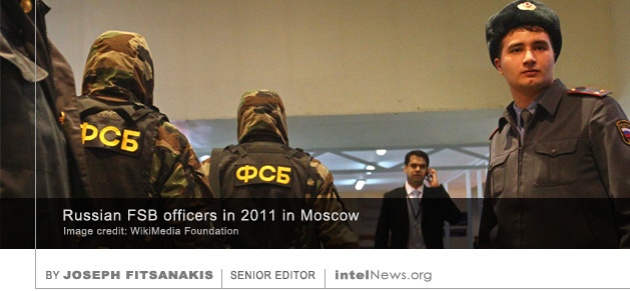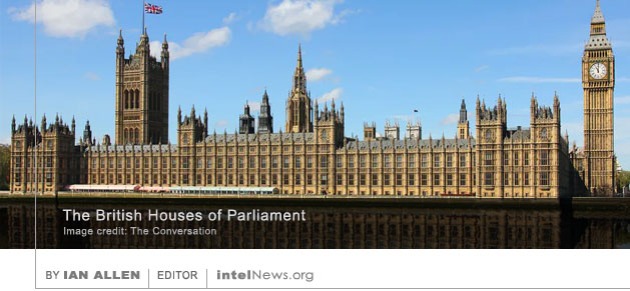France accuses Russia of disinformation campaign using Star of David graffiti in Paris
November 13, 2023 Leave a comment
 THE FRENCH GOVERNMENT HAS accused Russia of carrying out a disinformation campaign using stenciled images of Stars of David that mysteriously appeared in the streets of Paris late last month. The stars, between 60 and 80 in number, were found in the 14th arrondissement of the French capital, as well as in several Parisian suburbs in the early hours of October 31. The stars (see accompanying picture) are all blue and all have the same size. They appear to have been hurriedly stenciled and have no accompanying text.
THE FRENCH GOVERNMENT HAS accused Russia of carrying out a disinformation campaign using stenciled images of Stars of David that mysteriously appeared in the streets of Paris late last month. The stars, between 60 and 80 in number, were found in the 14th arrondissement of the French capital, as well as in several Parisian suburbs in the early hours of October 31. The stars (see accompanying picture) are all blue and all have the same size. They appear to have been hurriedly stenciled and have no accompanying text.
A statement issued on November 8 by the prosecutor for the city of Paris, Laure Beccuau, said that police had identified and arrested a man and a woman in connection with the graffiti. Referencing surveillance camera footage, Beccuau’s statement said the two suspects had stenciled the stars overnight, working in unison with a third individual who took photographs of the graffiti. The statement added that the alleged perpetrators of the graffiti may have contacts with another couple, consisting of an unnamed 28-year-old Moldovan woman and a 33-year-old Moldovan man. Police had arrested the Moldovans in Paris on October 27, for painting the same stenciled Start of David on a building in Paris.
The statement by the Paris prosecutor alleges that both couples had been in contact “with the same third party”, a Russian-speaking individual who had offered to pay them in exchange for graffitiing the stars. “It therefore cannot be ruled out that the tagging of the blue Stars of David in the Paris region was carried out at the explicit request of a person living abroad”, the statement concludes. Some reports speculated that the graffiti may have been part of a campaign by a “foreign actor trying to undermine French social cohesion”.
Last Thursday, the French Ministry for Europe and Foreign Affairs openly accused Russia for carrying out a disinformation campaign aimed at amplifying the Star of David graffiti on social media, allegedly in order to discredit France. The ministry said the disinformation campaign reflected “a persisting opportunistic and irresponsible strategy of using international crises to create confusion and tensions in the public debate in France and in Europe”. Later on the same day, the Embassy of the Russian Federation in Paris issued a statement on social media, condemning France’s “groundless attempts to seek out a ‘Russian connection’ in events having no connection with our country and pin responsibility on Russia with the sole aim of discrediting it”.
► Author: Joseph Fitsanakis | Date: 13 November 2023 | Permalink
 A SERIES OF COORDINATED drone strikes that struck Moscow last week were not random, but may in fact have targeted the homes of senior Russian intelligence officials, according to a new report by an American television network, which cited knowledgeable sources and data by an open-source research firm.
A SERIES OF COORDINATED drone strikes that struck Moscow last week were not random, but may in fact have targeted the homes of senior Russian intelligence officials, according to a new report by an American television network, which cited knowledgeable sources and data by an open-source research firm. THE PRESIDENT OF UKRAINE, Volodymyr Zelensky, warned on Thursday that teams or Russian assassins have already entered the nation’s capital, Kiev, with orders to kill him and his family. Zelensky made this
THE PRESIDENT OF UKRAINE, Volodymyr Zelensky, warned on Thursday that teams or Russian assassins have already entered the nation’s capital, Kiev, with orders to kill him and his family. Zelensky made this  A LITTLE KNOWN SPY unit, which experts have described as a mysterious “third espionage agency” inside the Russian intelligence apparatus, is said to be behind a “kill/capture list” that Moscow allegedly plans to put to use in Ukraine. United States government officials
A LITTLE KNOWN SPY unit, which experts have described as a mysterious “third espionage agency” inside the Russian intelligence apparatus, is said to be behind a “kill/capture list” that Moscow allegedly plans to put to use in Ukraine. United States government officials  A FEW MONTHS AFTER France’s establishment of an agency to combat foreign disinformation, Sweden has announced the creation of a new government authority, whose mission is to defend against disinformation by foreign actors. Based in Karlstad, a city 200 miles west of Stockholm, the Swedish Psychological Defense Agency (PDA) was formally established on January 1. Its
A FEW MONTHS AFTER France’s establishment of an agency to combat foreign disinformation, Sweden has announced the creation of a new government authority, whose mission is to defend against disinformation by foreign actors. Based in Karlstad, a city 200 miles west of Stockholm, the Swedish Psychological Defense Agency (PDA) was formally established on January 1. Its 
 Britain is abuzz today with news of the long-awaited release of the Parliament’s
Britain is abuzz today with news of the long-awaited release of the Parliament’s  considerably longer. It was given to the prime minister on October 17. But by November 6, when parliament was dissolved in preparation for the election that brought Boris Johnson to power, it had not been approved. It finally came out yesterday, after numerous and inexplicable delays. Many speculated that the government did not want to deal with the uncomfortable conclusions in the report.
considerably longer. It was given to the prime minister on October 17. But by November 6, when parliament was dissolved in preparation for the election that brought Boris Johnson to power, it had not been approved. It finally came out yesterday, after numerous and inexplicable delays. Many speculated that the government did not want to deal with the uncomfortable conclusions in the report. The president of Serbia has said that foreign intelligence services were partly behind a violent protest on Tuesday, which ended up with rioters storming the national parliament building in the capital Belgrade. The protest began in the afternoon, apparently prompted by the government’s decision to reintroduce lockdown measures following a resurgence of COVID-19 incidents in the country. But by the evening the rally had evolved into a full-scale riot led by far-right militants, as well as by some far-left groups.
The president of Serbia has said that foreign intelligence services were partly behind a violent protest on Tuesday, which ended up with rioters storming the national parliament building in the capital Belgrade. The protest began in the afternoon, apparently prompted by the government’s decision to reintroduce lockdown measures following a resurgence of COVID-19 incidents in the country. But by the evening the rally had evolved into a full-scale riot led by far-right militants, as well as by some far-left groups. Intelligence and security services in France are investigating whether Russian involvement on social media and other platforms is playing a role in amplifying the so-called ‘yellow vests’ movement. Known in French as le mouvement des gilets jaunes, the campaign began online in May of this year as a popular protest against rising fuel prices and the high cost of living in France. In mid-November, the movement made its first public appearance with large demonstrations that have continued every weekend since then. Yellow vest protestors claim that tax increases are disproportionally affecting working- and middle-class people and that everyday life is becoming economically unsustainable in France. Some of the demonstrations have turned violent, and so far at least eight people have died as a result. The ensuing crisis has become the most significant threat to the government of Emmanuel Macron, as the protests are increasingly evolving into an anti-Macron rallies.
Intelligence and security services in France are investigating whether Russian involvement on social media and other platforms is playing a role in amplifying the so-called ‘yellow vests’ movement. Known in French as le mouvement des gilets jaunes, the campaign began online in May of this year as a popular protest against rising fuel prices and the high cost of living in France. In mid-November, the movement made its first public appearance with large demonstrations that have continued every weekend since then. Yellow vest protestors claim that tax increases are disproportionally affecting working- and middle-class people and that everyday life is becoming economically unsustainable in France. Some of the demonstrations have turned violent, and so far at least eight people have died as a result. The ensuing crisis has become the most significant threat to the government of Emmanuel Macron, as the protests are increasingly evolving into an anti-Macron rallies. Russia “paved the way” for last November’s seizure of Ukrainian Navy ships by launching a major cyber attack and disinformation campaign aimed at Ukraine, according to a cyber security firm and the European Union. In what has become known as the Kerch Strait incident of November 25, border service coast guard vessels belonging to the Russian Federal Security Service (FSB) opened fire on three Ukrainian Navy ships that were attempting to enter the Sea of Azov through the Kerch Strait. All three Ukrainian vessels, along with crews totaling 24 sailors, were captured by the Russian force and remain in detention. Ukraine condemned Russia’s action as an act of war and declared martial law in its eastern and southern provinces. But Moscow said the incident had been caused by a provocation by the Ukrainian government, in a desperate effort to increase its popularity at home. Meanwhile, the three Ukrainian ships and their crews remain in Russia.
Russia “paved the way” for last November’s seizure of Ukrainian Navy ships by launching a major cyber attack and disinformation campaign aimed at Ukraine, according to a cyber security firm and the European Union. In what has become known as the Kerch Strait incident of November 25, border service coast guard vessels belonging to the Russian Federal Security Service (FSB) opened fire on three Ukrainian Navy ships that were attempting to enter the Sea of Azov through the Kerch Strait. All three Ukrainian vessels, along with crews totaling 24 sailors, were captured by the Russian force and remain in detention. Ukraine condemned Russia’s action as an act of war and declared martial law in its eastern and southern provinces. But Moscow said the incident had been caused by a provocation by the Ukrainian government, in a desperate effort to increase its popularity at home. Meanwhile, the three Ukrainian ships and their crews remain in Russia. Facebook has said it is involved in an “arms race” against “bad actors” as it announced on Tuesday the removal of accounts that allegedly tried to subvert the upcoming mid-term elections in the United States. The social-media giant said its security division had
Facebook has said it is involved in an “arms race” against “bad actors” as it announced on Tuesday the removal of accounts that allegedly tried to subvert the upcoming mid-term elections in the United States. The social-media giant said its security division had  Iranian military officials have warned of extracting “revenge from foreign intelligence services”, as Reuters reported that an aggressive campaign against Tehran has been launched by Washington. On Sunday, the Reuters news agency said that senior officials in the administration of US President Donald Trump had launched a concerted offensive “meant to foment unrest” in the Islamic Republic.
Iranian military officials have warned of extracting “revenge from foreign intelligence services”, as Reuters reported that an aggressive campaign against Tehran has been launched by Washington. On Sunday, the Reuters news agency said that senior officials in the administration of US President Donald Trump had launched a concerted offensive “meant to foment unrest” in the Islamic Republic.  Latvian defense officials have hinted that Russia is trying to destabilize Latvia’s economy, as a Western-backed anti-corruption probe at the highest levels of the Baltic country’s banking sector deepens. Developments have progressed at a high speed since Monday of last week, when Latvia’s Corruption Prevention and Combating Bureau
Latvian defense officials have hinted that Russia is trying to destabilize Latvia’s economy, as a Western-backed anti-corruption probe at the highest levels of the Baltic country’s banking sector deepens. Developments have progressed at a high speed since Monday of last week, when Latvia’s Corruption Prevention and Combating Bureau  The British government has announced that it will form a new intelligence unit tasked with preventing the spread of so-called “fake news” by foreign states, including Russia. The decision was revealed earlier this week in London by a government spokesman, who said that the new unit will be named “National Security Communications Unit”. The spokesman added that the unit will be responsible for “combating disinformation by state actors and others”. When asked by reporters whether the effort was meant as a response to the phenomenon often described as “fake news”, the spokesman said that it was.
The British government has announced that it will form a new intelligence unit tasked with preventing the spread of so-called “fake news” by foreign states, including Russia. The decision was revealed earlier this week in London by a government spokesman, who said that the new unit will be named “National Security Communications Unit”. The spokesman added that the unit will be responsible for “combating disinformation by state actors and others”. When asked by reporters whether the effort was meant as a response to the phenomenon often described as “fake news”, the spokesman said that it was. A senior German intelligence official has warned that foreign powers, including Russia, could try to shape the outcome of talks by German parties to form a governing coalition, following last week’s national elections. The elections resulted in a major shakeup of Germany’s political landscape, as Chancellor Angela Merkel’s Christian Democratic Union lost nearly 10 percentage points compared to its 2013 election result. It is now forced to seek the participation of other conservative or centrist political parties in a broad governing alliance. Meanwhile, the far-right Alternative for Germany (AfD) won 12.6 percent, propelling it to third place and giving it 91 seats in the Bundestag. The AfD result marks the first time since 1945 that a German far-right party has managed to secure parliamentary representation.
A senior German intelligence official has warned that foreign powers, including Russia, could try to shape the outcome of talks by German parties to form a governing coalition, following last week’s national elections. The elections resulted in a major shakeup of Germany’s political landscape, as Chancellor Angela Merkel’s Christian Democratic Union lost nearly 10 percentage points compared to its 2013 election result. It is now forced to seek the participation of other conservative or centrist political parties in a broad governing alliance. Meanwhile, the far-right Alternative for Germany (AfD) won 12.6 percent, propelling it to third place and giving it 91 seats in the Bundestag. The AfD result marks the first time since 1945 that a German far-right party has managed to secure parliamentary representation.





